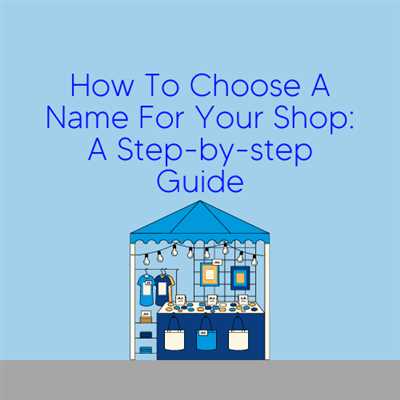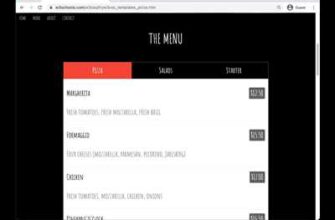
Choosing the right name for your shop is a critical first step in establishing your brand and attracting customers. A well-thought-out shop name can convey your product or service proposition, help customers understand what your business is about, and differentiate you from competitors. On the other hand, a poorly chosen name can confuse customers, lead to marketing challenges, and ultimately hinder the success of your business.
When brainstorming shop names, it’s important to consider a few key factors. First, think about your target audience and what kind of name would resonate with them. A name that might work well for a podcast generator may not work for a donut shop, for example. You’ll also want to avoid overly generic or boring names that don’t tell a story or convey any meaning. Instead, try to come up with names that are descriptive, catchy, and memorable.
Another important aspect to consider is the spelling and pronunciation of your chosen name. Hard-to-spell or difficult-to-pronounce names can make it more challenging for customers to find you online or recommend your shop to others. Additionally, be mindful of any geographic or industry-specific considerations that may impact your name choice. If you plan to expand your business beyond a specific region or industry, it’s best to choose a name that’s not too narrow or literal, to allow for scalability and flexibility.
Here are 12 tips backed by industry leaders, to help you get started in naming your shop:
- Be careful with using words that are too common or generic. You want your shop name to stand out and be unique.
- Consider using words that emphasize the product or service you offer. This can help customers understand what your shop is about at a glance.
- Think about incorporating your own name or a personal touch. This can add a sense of authenticity and connection with your brand.
- Get feedback from friends, family, and potential customers. They can offer different perspectives and help you identify any potential issues with the name.
- Use a name generator or online tools that can suggest ideas based on keywords or themes you provide.
- Look to other industries or companies for inspiration. While you should never copy another business’s name, you can draw inspiration from their creativity and branding strategies.
- Consider the availability of domain names. It’s important to have a website that matches your shop name, so check if the domain is available before finalizing your choice.
- Be mindful of cultural and language considerations. Make sure your shop name doesn’t have any unintended negative connotations or meanings in other languages.
- Choose a name that reflects the style and personality of your shop. Whether your business is sleek and modern or friendly and whimsical, your name should align with your brand image.
- Don’t be afraid to go beyond industry conventions. While it can be helpful to have a clear industry connection in your name, don’t limit yourself to the expected. A unique name can make your shop more memorable and intriguing.
- Consider the long-term implications of your chosen name. Avoid names that may be too trendy or that could potentially limit your business if you decide to expand or diversify in the future.
- Don’t underestimate the power of a good story. A compelling origin story can add depth and meaning to your shop name, creating an emotional connection with customers.
Remember, choosing a shop name is a crucial part of your marketing strategy. Put thought and care into the process, and you’ll create a name that not only resonates with your target audience but also sets the stage for a successful and memorable brand.
- 12 Tips For Naming Your Startup Business
- Don’t get stuck with another boring business name
- Sample business name ideas to inspire you
- Backed by Industry Leaders
- Domain Name Generator
- Podcast Name Generator
- Store Name Generator
- Product Name Generator
- Guidelines for Business Name Ideas
- Understand your business
- Use descriptive words
- Be literal
- Choose a name style
- Avoid hard-to-spell names
- Tell a story
- Get feedback on the name
- Don’t be too narrow
- Be careful about geographic names
- Video:
- The Best AI Business Name Generator
12 Tips For Naming Your Startup Business
When it comes to naming your startup business, coming up with the perfect name can be a daunting task. The name you choose will not only be the first impression you make with potential customers, but it will also become an integral part of your brand identity. Here are 12 tips to help you navigate the process of naming your startup business:
- Be Creative: Brainstorm ideas that are unique and reflect the essence of your business.
- Don’t be too literal: Avoid using names that are too descriptive or narrow, as they may limit your future growth.
- Think about your target audience: Choose a name that will resonate with your target market.
- Consider your brand proposition: Your name should convey the value and benefits your business provides.
- Get feedback: Share your potential names with others to gather feedback and ensure they have a positive impact.
- Use a name generator: If you’re stuck, consider using a name generator for inspiration.
- Think about scalability: Choose a name that can grow with your business and won’t restrict you as you expand into new areas.
- Be careful with words: Consider how the name will be spelled and pronounced, and avoid hard-to-spell or confusing words.
- Avoid geographic limitations: Unless your business is specifically tied to a location, avoid using a name that is too tied to a specific region.
- Consider domain availability: Check if the domain name for your business is available before finalizing your choice.
- Emphasize your industry: Choose a name that reflects the industry you’re in and the expertise you offer.
- Inspire your team: Your business name should also inspire your team and convey the passion and determination behind your startup.
Naming your startup business is a crucial part of your marketing and branding strategy. It’s not just about picking a name; it’s about choosing a name that tells a story, resonates with your audience, and sets you apart from your competitors. With these 12 tips, you’ll be well-equipped to find that perfect name for your startup business.
Don’t get stuck with another boring business name
In the world of marketing, a catchy and memorable business name can make a huge difference in the success of your venture. It can help you stand out from the competition, get noticed by your target audience, and create a strong brand identity. But coming up with a unique and impactful business name is not an easy task. If you get stuck with another boring business name, it can limit your growth and hinder your overall marketing efforts.
When choosing a business name for your online store or startup, it’s important to keep in mind a few key factors. First, the name should clearly convey what your product or service is about. It should also emphasize your unique value proposition and differentiate you from the competition. Additionally, the name should be scalable and flexible enough to accommodate future growth and expansion.
One way to generate business name ideas is to look at industry leaders and successful brands for inspiration. While you shouldn’t outright copy their names, you can use them as a starting point to brainstorm and come up with your own unique ideas. Another option is to tell a story with your business name, using words that evoke emotions and inspire determination in your target audience.
When choosing a business name, it’s important to be careful with words that may have multiple meanings or that may be hard to spell. You don’t want potential customers to struggle to remember or pronounce your name. Also, be sure to check if the domain name is available for the name you choose. It’s important for your online presence to align with your branding and store name.
Don’t rely solely on online business name generators. While these tools can help you get started, they often produce generic and literal names that may not effectively convey your unique brand identity. Instead, take your time to brainstorm, gather feedback from friends and family, and choose a name that truly reflects your business and resonates with your target audience.
Avoid using descriptive names that are too narrow and limit your potential for growth. For example, if you are starting a catering company and name it “Uncle Donuts,” it may confuse potential customers about the type of services you offer. Instead, choose a name that can encompass a broader range of offerings.
Based on geographic location, use words that are spellable and easy to understand. This will ensure that potential customers can find you easily and remember your name. Also, consider the style and tone of your industry when choosing a name. You want your business name to resonate with your target audience and convey the right image.
In summary, when choosing a business name, don’t settle for another boring and uninspiring option. Take the time to brainstorm, gather feedback, and come up with a name that truly captures the essence of your brand. Keep in mind the guidelines mentioned above and avoid hard-to-spell, narrow, or generic names. A carefully chosen business name can set the stage for the success of your venture.
Sample business name ideas to inspire you
Choosing a business name is a crucial step in creating a successful brand. Your business name should convey your company’s personality, values, and the products or services you offer. It should also be memorable and unique, standing out in a competitive marketplace.
When it comes to naming your business, there are a few guidelines that you can follow to help you make the right decision. Here are 12 sample business name ideas to inspire you:
- Catering Creations: This name emphasizes that your business is in the catering industry and conveys a sense of creativity.
- Donut Delights: A descriptive name that clearly tells potential customers what your business is about. It’s catchy and easy to remember.
- Uncle Mike’s Podcast: If you’re starting a podcast, using a person’s name can make it more relatable and personal.
- Backed by Determination: This business name emphasizes the determination and hard work that went into creating your company, making it memorable.
- Geographic Goods: If your business is based in a specific location, a name like this one can convey that sense of place.
- Marketing Leaders: This name emphasizes that your company is a leader in the marketing industry, instilling confidence in potential customers.
- Product Stylist: Perfect for a business that focuses on helping customers style and enhance their products.
- Scalable Solutions: This name suggests that your company offers solutions that can grow and adapt with the needs of the customer.
- Storyteller’s Branding: This name conveys that your company specializes in creating compelling and memorable brand stories.
- The Name Generator: If you have a business that helps others come up with creative names, this straightforward and descriptive name is perfect.
- Word Wizards: A playful and catchy name that emphasizes your expertise in crafting engaging and impactful words.
- You’ll Careful Donuts: This name uses a pun to convey that your business is not only about donuts but also cares about quality and attention to detail.
When choosing a business name, consider your target audience, the industry you’re in, and the overall brand image that you want to convey. Avoid boring or hard-to-spell names that won’t resonate with your customers. Always check if the domain name is available before finalizing your decision. Don’t be afraid to seek feedback from friends, family, or even potential customers to ensure that your business name resonates with them. With these sample ideas and tips, you’ll be inspired to create a unique and compelling business name that tells your story and sets you apart from the competition.
Backed by Industry Leaders
When choosing a name for your startup or business, it’s important to consider several factors that will help convey your brand’s story, style, and value proposition. One of these factors is the backing and support your company receives from industry leaders.
Having industry leaders backing your business not only adds credibility and trust, but it also shows that your company is on the right track. Potential customers will understand that your product or service has been vetted and approved by those who are knowledgeable and experienced in the industry.
Using the names of industry leaders in your business name or incorporating their endorsement can help emphasize the level of quality and expertise your company offers. For example, if your startup is in the podcast industry, you could consider a name like “PodcastPro,” which conveys that your company is backed by podcasting professionals and experts.
When brainstorming names, remember to be careful of using hard-to-spell or too literal names. While it’s important to choose a descriptive name that conveys what your business is about, it’s also crucial to choose a name that is easy to remember and spell. Uncle Donuts, for example, is a clever and catchy name for a donut store, but if it’s hard to spell or remember, it won’t be as effective in marketing or branding efforts.
Another tip is to avoid names that are too narrow or geographic-based, as they may limit your company’s potential for growth and scalability. Instead, choose a name that can grow with your business and is not limited by a specific location or product.
Getting feedback from others is also important when choosing a name. You might have some great ideas, but it’s always helpful to get input from friends, family, or even potential customers. They can offer a fresh perspective and help you narrow down your options.
| Tips for Choosing a Name |
|---|
| 1. Be descriptive. Choose a name that conveys what your business is about. |
| 2. Use industry-related words. Incorporate relevant keywords that align with your product or service. |
| 3. Don’t be afraid of using a name generator. It can help you come up with creative and unique ideas. |
| 4. Avoid boring or generic names. Stand out from the competition and inspire interest in your brand. |
| 5. Spell carefully. Double-check the spelling of your chosen name to avoid any confusion or misspelling. |
| 6. Consider the domain name availability. Make sure the name you choose has an available domain for your website. |
With these guidelines in mind, you’ll be able to choose a name for your startup or business that is not only backed by industry leaders but also conveys your brand’s story and value proposition.
Domain Name Generator
Choosing the right domain name for your business is a crucial step in creating a memorable and successful online presence. A domain name should convey the essence of your brand and clearly tell customers what your company is all about. It should also be easy to spell, easy to remember, and not too similar to another company’s domain.
However, coming up with a great domain name can be a challenging task. That’s where a domain name generator can come in handy. These tools can help you generate unique and catchy names based on a set of guidelines and industry-specific keywords. Here are some tips to help you use a domain name generator effectively:
1. Understand your brand and product
Before using a domain name generator, have a clear understanding of your brand, your target audience, and the industry you are in. This will help you choose a domain name that aligns with your brand and emphasizes your unique value proposition.
2. Be descriptive
A descriptive domain name can give customers a clear idea of what your business is all about. Use words that convey the nature of your business, such as “catering,” “store,” or “donuts.”
3. Avoid hard-to-spell and hard-to-pronounce words
While it’s important to choose a domain name that stands out, be careful not to choose one that is too difficult to spell or pronounce. You don’t want potential customers to get stuck or confused when trying to find your website.
4. Use a domain name generator
A domain name generator can provide you with a list of unique and creative domain name ideas. Simply enter your keywords, choose the style you are looking for (e.g., literal, geographic, generic), and let the generator do the work for you.
5. Get feedback
Once you have a shortlist of potential domain names, don’t hesitate to ask for feedback from friends, family, colleagues, or even potential customers. They can provide valuable insights and help you choose the best name.
6. Narrow down your options
Choose a domain name that not only resonates with your brand but is also scalable. You don’t want to limit your business growth due to a narrow domain name.
7. Be careful with branding and naming
Make sure the domain name you choose aligns with your overall branding strategy. It should be consistent with your company name, logo, and other marketing materials.
By following these guidelines and using a domain name generator, you’ll have a better chance of finding a unique and catchy domain name that will help elevate your business and make a strong online presence.
Podcast Name Generator
Choosing a catchy and memorable name for your podcast is crucial for attracting listeners and building a strong brand. However, coming up with an original and impactful name can be challenging. This is where a podcast name generator can be a valuable tool.
An effective podcast name generator can provide you with numerous ideas that convey the style, theme, and essence of your podcast. It takes into consideration factors such as industry, product, target audience, and geographic location to generate relevant and creative names.
When using a podcast name generator, be careful not to get stuck on generic or boring names. It’s important to choose a name that stands out from the competition and reflects the unique aspects of your podcast. Look for names that are descriptive and can help tell your story, or use literal words that relate to your podcast topic.
Here are 12 tips to help you choose a podcast name using a name generator:
- Focus on your target audience: Catering your podcast name to the interests and preferences of your target audience can make it more appealing.
- Convey your brand proposition: Use words that emphasize the value or benefit your podcast offers to listeners.
- Avoid hard-to-spell or hard-to-understand words: You want your podcast name to be easily recognizable and memorable.
- Be careful with geographic-based names: If your podcast has a specific geographic focus, consider if it might limit your potential audience.
- Get feedback: Share the generated name ideas with friends, family, or colleagues and gather their opinions and suggestions.
- Consider scalability: Choose a name that allows for future growth or expansion of your podcast.
- Don’t be too narrow: While it’s important to have a focused niche, make sure your podcast name doesn’t limit your potential reach.
- Look for inspiration from other industries: Explore naming trends and successful podcast names in other industries that can spark creativity.
- Tell a story: A name that tells a story or evokes curiosity can intrigue potential listeners.
- Avoid using generic words: Stand out from the crowd by avoiding overused words or phrases that don’t add value to your podcast name.
- Use descriptive words: Choose words that clearly convey the essence and topic of your podcast.
- Backed by determination: Be persistent and keep generating names until you find the perfect fit that resonates with you and your podcast.
Using a podcast name generator can provide you with a wide range of creative and unique name ideas for your podcast. Take your time to explore the generated names and choose the one that best represents your brand and resonates with your target audience.
Store Name Generator
Choosing a name for your store is an important step in establishing your brand. A well-thought-out and catchy store name can attract customers and help you stand out in a crowded market. Here are 12 guidelines to consider when naming your store:
- Understand your product or industry: Choose a name that reflects what you are selling or the industry you are in. This will help customers immediately understand what your store is about.
- Avoid hard-to-spell words: Don’t make it difficult for customers to find you online or recommend your store to others. Stick to words that are easy to spell and remember.
- Be unique and distinctive: Create a brand name that is not similar to existing store names. You don’t want customers to confuse your store with another one.
- Consider scalability: If you plan to expand your business in the future or add more products, choose a name that allows for growth.
- Emphasize your unique selling proposition: Your store name can convey the unique value or benefits that you offer to customers.
- Get feedback: Test potential store names with family, friends, or customers to get their opinion. They can provide valuable insights and help you choose the best option.
- Consider geographic inspiration: If your store is catering to a specific region or community, using geographic-related words in the name can create a sense of local connection.
- Story-based names: A store name based on a personal or company story can evoke emotions and create a deeper connection with customers.
- Avoid literal or boring names: Instead of using generic or descriptive names that do not stand out, choose a name that is more creative and memorable.
- Stay true to your brand: Your store name should align with your brand’s style, values, and target audience.
- Choose a domain-friendly name: Make sure the store name you choose is available as a domain name for your website.
- Don’t get stuck with this naming work: If you are having trouble coming up with a name, consider using a store name generator to inspire ideas.
By following these guidelines, you’ll be able to choose a store name that not only reflects your brand but also resonates with your target audience. Remember, the name you choose will be the foundation of your marketing and branding efforts, so take the time and determination to find the perfect one.
Product Name Generator
Choosing a name for your product or business can be a challenging task. You want a name that is unique, memorable, and conveys the essence of what you’re offering. To help you get started, we’ve put together a product name generator that can give you some fresh ideas.
1. Get inspired by your industry: Look for keywords and terms that are commonly used in your industry. This will help you create a name that is relevant and easily understood by your target audience.
2. Tell a story: A great name should not only describe your product, but also tell a story. Think about what inspired you to start your business and use that as a starting point to create a name that resonates with your customers.
3. Emphasize your unique selling proposition: Your product or business likely has some unique features or benefits. Use these to your advantage and incorporate them into your name to convey what sets you apart from your competitors.
4. Cater to your target audience: Consider who your ideal customers are and what language and style will resonate with them. Your product name should appeal to this specific group of people.
5. Avoid boring and generic names: Boring names won’t get you noticed. Be creative and choose a name that stands out and grabs attention.
6. Use descriptive words: Your product name should be descriptive enough that it gives potential customers a good idea of what you’re offering.
7. Use geographic names if applicable: If your product or business is location-specific, consider incorporating a geographic element into your name. This can help establish a sense of identity and differentiate you from the competition.
8. Be careful with hard-to-spell names: While it may be tempting to choose a unique or cleverly spelled name, make sure it’s not too difficult for people to remember or search for online. You want your name to be easily pronounceable and searchable.
9. Seek feedback: Once you have a few name options, seek feedback from friends, family, and potential customers. This can help you gauge their reactions and make sure your name is appealing and resonates with your target audience.
10. Use a name generator: If you’re still stuck, try using a name generator tool. These online tools can provide you with a list of potential names based on keywords or other criteria you provide.
Remember, choosing a name for your product or business is an important part of your branding and marketing strategy. It should convey your unique value proposition and resonate with your target audience. So take your time, be creative, and choose a name that you’ll be proud to represent your company.
Sample Names:
- Backed by Uncle Sam
- Determination Donuts
- Geographic Gear
- Industry Insights
- Podcast Power
- Scalable Solutions
- Storyteller Store
- Workaholic Wear
Guidelines for Business Name Ideas
Choosing a name for your business is an important decision that can greatly impact your success. The right name should convey what your business is about, be easy to spell and remember, and also make a strong marketing impact.
When brainstorming business name ideas, it’s important to consider the following guidelines:
- Be descriptive: Your business name should tell customers what you do or what product you offer. Avoid using generic or literal names that don’t convey any information about your business.
- Stay relevant: Choose a name that is relevant to your industry. It should cater to your target audience and emphasize what makes your business unique.
- Think long-term: Consider the scalability of your business and choose a name that won’t limit your growth. Avoid using geographic or narrow names that might hinder future expansion plans.
- Get feedback: Don’t get stuck on a name without seeking feedback from others. Ask for opinions from family, friends, and potential customers to get a wider perspective.
- Use a name generator: If you’re struggling to come up with ideas, use a business name generator tool. These tools can provide you with a sample list of names based on keywords and industry.
- Consider your brand: Your business name should align with your brand identity. It should reflect the style and values you want to convey to your customers.
- Be careful with words: Be cautious when using words that are hard to spell or have multiple interpretations. You don’t want potential customers to get confused or misspell your business name.
- Don’t be too generic: Avoid choosing a name that is too generic or boring. You want a name that stands out and sparks curiosity or interest in your target audience.
- Tell a story: Your business name can tell a story about your company or the product/service you offer. It can evoke emotions or create a sense of determination.
- Consider the domain: Check the availability of the domain for your chosen business name. Having a matching domain name is important for online presence and branding.
- Inspire confidence: Your business name should inspire confidence and trust in your customers. Choose a name that conveys professionalism and reliability.
- Backed by a value proposition: Your business name should align with the value proposition you offer to your customers. It should clearly communicate the benefits they can expect from your business.
By following these guidelines and considering the tips mentioned above, you’ll be able to choose a business name that not only stands out but also resonates with your target audience. Remember, the right name can make a significant impact on your success and branding efforts.
Understand your business
When it comes to naming your business, it’s important to first understand what your business is all about. This will help you come up with a name that accurately conveys the industry you work in and the product or service you offer. By choosing a name that is descriptive, you can immediately tell potential customers what your business is about and what you have to offer.
For example, if you’re starting a donut shop, you could use words like “donuts” or “bakery” in your name to emphasize the type of product you offer. You could also incorporate words that convey the style or geographic location of your store, such as “artisan” or “Brooklyn.”
Another important aspect to consider is the scalability of your business. While it might be tempting to choose a name based on a literal meaning or a personal story (like naming your donut shop “Uncle John’s Donuts”), this may not be the best option if you plan on expanding your business beyond a single location or a specific product. It’s important to choose a name that is broad enough to accommodate future growth, such as “Doughnut Delights” or “Sweet Treats.”
When naming your business, be careful to avoid words that are hard to spell or pronounce. It’s also important to consider the domain availability for your chosen name, as this will be crucial for your online presence. You can use online domain name generators or check the availability of domains to get ideas and feedback. Additionally, consider the branding and marketing guidelines that you want to follow, as these will help shape the overall image of your business.
Ultimately, the name you choose should be unique, catchy, and memorable. It should inspire curiosity and tell a story about your business. By understanding your business and following these naming tips, you’ll be able to choose a name that not only represents your brand and proposition, but also resonates with your target audience and stands out from your competitors.
Use descriptive words
When choosing a name for your business, it’s important to use descriptive words that convey the nature of your store or product. You don’t want a name that is too literal or boring, but you also want to avoid names that are hard-to-spell or don’t convey the right message.
One tip is to think about the story behind your business and use words that emphasize your unique selling proposition. For example, if you’re starting a donut shop based on a family recipe, you could choose a name like “Uncle Joe’s Donuts,” which not only tells a story but also conveys the idea of a trusted and family-oriented brand.
Another tip is to consider the geographic area you’ll be catering to and use words that are associated with that location. For example, if you’re opening a seafood restaurant in New England, you could choose a name like “Narrow Bay Seafood” to emphasize the local and fresh aspect of your offerings.
Using descriptive words in your store name can also inspire ideas for your branding and marketing efforts. For example, if you choose a name like “Backed By Nature,” you can convey the message that your products are eco-friendly and sustainable, which can be a strong selling point for many consumers.
It’s important to understand the industry you’ll be working in and use words that are relevant to that field. For example, if you’re starting a tech startup, you could use words like “Scalable Solutions” or “Tech Leaders” to convey the idea that your company is focused on growth and innovation.
When brainstorming names, it’s also helpful to use a name generator or seek inspiration from sample names in your industry. But be careful not to get stuck in the naming process – sometimes it’s better to choose a name and start working on your business than to spend too much time searching for the perfect one.
Lastly, don’t forget to get feedback from others on the names you’re considering. It’s always helpful to get an outside perspective and see if the name resonates with others or if it needs further refinement. Remember, your business name will be the foundation of your brand, so choose it carefully and make sure it reflects the style and values of your company.
Be literal
When it comes to choosing a name for your brand or company, it’s important to be literal. Being literal means using words that directly convey the story or proposition of your business. This approach can help your potential customers easily understand what your business is all about and what you offer.
However, you need to be careful when choosing literal words, as you don’t want your name to be too generic or boring. For example, if you’re opening a donut store, using the name “Donuts” might not be the best choice. Instead, you can be more creative and choose a name like “Sweet Cravings Donut Co.” that emphasizes your product and style.
Another important aspect to consider is the spellability of your name. If your business name is hard-to-spell, it can be challenging for your potential customers to find you online or recommend your business to others. Make sure your name is easy to spell and remember.
Don’t limit yourself to one industry or style. Be open to choosing words that can inspire and cater to a wider range of audiences. For example, if you’re starting a podcast about storytelling, don’t restrict yourself to names like “Podcast Storytellers” or “Storytelling Adventures.” Instead, think outside the box and choose a name that conveys the essence of your podcast but also leaves room for growth and scalability.
One tip to avoid getting stuck on naming your business is to use a name generator. There are plenty of online tools available that can generate a list of ideas based on your industry, style, or geographic location.
Before finalizing your name, seek feedback from your friends, family, or industry leaders. Getting feedback can help you understand how others perceive your name and whether it resonates with your target audience.
Remember, your brand name is an essential part of your branding and marketing strategy. It should be backed by a clear and scalable determination to convey your story and proposition effectively.
By following these tips, you can choose a name that reflects your brand and leaves a lasting impression on your customers.
Choose a name style
When it comes to choosing a business name for your shop, there are a few tips you should keep in mind. You want a name that is both memorable and reflective of your company’s brand and proposition. Here are some guidelines to help you in the process:
1. Be descriptive: Choose a name that tells potential customers what your business is about. For example, if you are opening a donut shop, a name like “Delicious Donuts” would work well.
2. Get feedback: Ask friends, family, or industry leaders for their opinions on the names you are considering. Their feedback can be a valuable source of inspiration and help you make an informed decision.
3. Understand your industry: It’s important to choose a name that is appropriate for your industry. For example, if you are starting a podcast, a more playful and catchy name might be suitable, while a catering business may opt for a more professional and sophisticated name.
4. Avoid hard-to-spell words: Choose a name that is easy to spell and remember. You don’t want potential customers to get stuck when trying to find your store or when referring your business to others.
5. Don’t be too literal: While it’s important for the name to convey what your business is about, avoid using words that are too generic or overly specific. You want a name that is unique and stands out from competitors.
6. Consider geographic names: If your business is local or has a specific geographic focus, consider incorporating that into the name. It can help create a sense of identity and connection with your target audience.
7. Use a naming generator: If you’re having a hard time coming up with ideas, there are online naming generators that can provide you with a sample list of potential names. Just be careful and ensure that the generated names align with your brand and business goals.
8. Cater to your target audience: Keep your target audience in mind when choosing a name. It should resonate with them and evoke a positive impression.
9. Avoid boring or generic names: Choose a name that stands out and grabs attention. You want to create a memorable and unique brand.
Remember, the name you choose for your shop is a reflection of your brand and will be used in all your marketing efforts. Take the time to find a name that works for you and the message you want to convey.
Avoid hard-to-spell names
When choosing the name for your store, you want to make sure it is easily understandable and memorable. One way to do this is to avoid hard-to-spell names. If your store name is difficult to spell, potential customers may have a hard time finding you in search engines or when typing in your website address.
Here are some tips to avoid hard-to-spell names:
- Be careful with using words that are too literal or descriptive. While it’s important to convey what your store is about, choosing a name that is too narrow or based on a specific geographic location may limit your potential reach.
- Avoid using industry-specific jargon or terms that may not be widely known. While it may seem clever to use industry buzzwords, it may confuse or alienate potential customers.
- Consider using a name generator tool. There are many online tools available that can help you generate unique and catchy names for your store. These tools take into account keywords and your desired style or industry to provide you with a list of potential names.
- Get feedback from others. It’s always a good idea to get input from friends, family, or even potential customers. They can provide valuable insight and help you choose a name that resonates with your target audience.
- Avoid boring and uninspiring names. Your store name should inspire curiosity and capture the essence of your brand. Think about what sets your business apart and emphasize those qualities in your name.
- Don’t get stuck on one idea. It’s important to explore multiple ideas before settling on a name. Brainstorm a list of potential names and then narrow it down based on your branding goals and target market.
- Don’t be afraid to be creative. Your store name can be a play on words, a pun, or a combination of words that convey your unique selling proposition. Just make sure it’s still easy to spell and understand.
- Consider the domain availability. Before finalizing your store name, check if the domain name is available. Having a domain name that matches your store name can make it easier for customers to find you online.
- If you’re still stuck, tell a story. Sometimes sharing a personal story or a sample of the products you offer can help you come up with a name that resonates with your audience.
- Remember, scalable and scalable. As your business grows, your store name should still make sense. Avoid choosing a name that may limit your business if you decide to expand or change your product offerings in the future.
- Lastly, don’t forget about marketing and branding. Once you have chosen your store name, make sure to invest in marketing efforts to promote your brand and establish a strong presence in your industry.
By following these tips and guidelines, you’ll be able to choose a store name that is easy to spell, memorable, and aligns with your business goals.
Tell a story
Telling a story through your shop name is a powerful way to stand out in the crowded marketplace. By creating a narrative around your company, you can make potential customers feel connected to your brand and understand what your business is all about. Here are some tips to help you choose a name that tells a story:
Avoid literal and boring names: Don’t get stuck using generic and uninspiring words that simply describe your industry. Instead, use descriptive words that convey the determination and style of your business.
Get geographic inspiration: If your company is based in a specific location, consider using words that are associated with that area to add a sense of uniqueness to your name.
Emphasize your unique selling proposition: Choose a name that highlights what sets your company apart from competitors and what makes your products or services special.
Careful with hard-to-spell words: While it can be tempting to use uncommon or creative spellings of words, it’s important to consider if it will make it difficult for customers to find and remember your business.
Use a storytelling brand generator: There are online tools available that can help you generate unique and creative name ideas for your business. These generators work by taking input about your industry, company values, and target audience to come up with suggestions that tell a story.
Sample feedback: Once you have a list of potential names, ask for feedback from friends, family, and potential customers. Their input can help you narrow down your options and choose the name that resonates the most with your target audience.
Avoid hard-to-spell and hard-to-search domain names: Make sure the domain name associated with your shop name is easy to spell and remember. This will make it easier for customers to find your website and online store.
Backed by a compelling story: Your shop name should be backed by a compelling story that connects with your target audience. This can be the story of how your business started, your values, or the inspiration behind your products.
Telling a story with your shop name is not only a marketing tactic, but it also helps create a strong brand identity. Choose a name that reflects the essence of your business and conveys a sense of passion and determination. By following these guidelines, you’ll be able to choose a name that not only tells a story but also helps your business stand out in the competitive marketplace.
Get feedback on the name

After coming up with a list of potential names for your shop, it’s important to get feedback on them before making a final decision. It can be easy to get attached to a name that you personally like, but it’s essential to gather opinions from others to ensure that your chosen name is appealing to a wider audience.
One way to gather feedback is to simply ask people what they think about the name. Be open to both positive and negative feedback and listen carefully to the reasons behind their opinions. If someone finds the proposed name boring or uninteresting, ask them what kind of word or proposition would be more appealing to them. If the feedback is consistent across multiple people, it might be wise to choose another name that better aligns with their preferences.
When asking for feedback, be sure to provide some context about your business and the style you envision for your shop. You can do this by using descriptive words and phrases to convey the essence of your brand. For example, if you are starting a donut company, you might describe your shop as a gourmet donut store that specializes in unique flavors and creative designs. This can help people understand your determination and passion behind the chosen name.
Take the feedback you receive into account, but also remember that naming a business is a subjective process. There is no one-size-fits-all approach, and what works for one company may not work for another. It’s about finding a balance between feedback from others and staying true to your own vision for your brand.
If you’re feeling stuck and need some inspiration, there are various online resources available to help with the naming process. You can use a startup branding generator, which provides a list of potential names based on words or themes you input. Additionally, you can look at sample names in your industry for ideas or even consult with marketing leaders who specialize in naming to get their expert opinions.
When brainstorming names, it’s important to consider the scalability and domain availability of the options. You want a name that can grow with your business and is easy for customers to remember and spell. Avoid hard-to-spell words or names that are too literal, as they may not resonate with your target audience.
Another important factor to consider is your geographic location and the product or service you offer. If you have a catering business that primarily serves customers in a specific city, you may want to include the city name in your business name to emphasize your local roots. On the other hand, if you have ambitions for a global audience, a more generic name can be more appropriate.
Don’t be afraid to get creative with your naming process and think outside the box. Sometimes the most unexpected ideas can lead to the best names. Just be careful not to choose a name that is too quirky or obscure, as it may confuse potential customers and make it harder for your business to establish a strong brand presence.
Remember, the name of your shop is an essential part of your overall branding strategy. It should reflect the personality and values of your business while also being memorable and appealing to your target audience. By gathering feedback, understanding naming guidelines, and staying true to your brand story and goals, you’ll be well on your way to choosing the perfect name for your shop.
Don’t be too narrow
When it comes to choosing a name for your business or store, it’s important to be careful not to be too narrow. While you want to convey the essence of your brand and cater to your target audience, you also want to leave room for growth and expansion.
Choosing a name that is too specific to a certain product or geographic location may limit your future options. For example, if you name your store “Uncle Joe’s Donuts,” it may be difficult to expand your offerings beyond donuts in the future.
Instead, consider choosing a name that is more broad and scalable. This will give you the flexibility to add new products or services as your business grows.
When brainstorming ideas for your business name, think about the words that inspire you and convey the story of your brand. You can also use a name generator or ask for feedback from industry leaders and marketing professionals.
Be careful to avoid hard-to-spell or boring names. You want a name that is easy to remember and tells a compelling story about your company. It’s also important to choose a domain name that is available and reflective of your brand proposition.
Remember, your business name is the literal and figurative first impression customers will have of your brand. Choose a name that will inspire and emphasize the unique value you bring to the market.
Don’t get stuck on a name that is too narrow in its scope. Think about the long-term goals you have for your business and choose a name that will grow with you.
By avoiding narrow names, you’ll have a better chance of finding a name that is memorable, scalable, and backed by a strong brand story. So, get your determination and creativity flowing, and start brainstorming for the perfect name for your startup or store!
Be careful about geographic names
When choosing a name for your new business, it’s important to consider the implications of using geographic names. While these names can be descriptive and convey a sense of location, they may also limit the scalability and reach of your brand.
If you’re starting a local business that caters to a specific area, using a geographic name can work to your advantage. It helps potential customers understand where you’re based and what you offer. For example, a donut store named “Uncle Joe’s Donuts NYC” conveys a sense of place and emphasizes that it is a local business.
However, if your goal is to create a brand that can expand nationally or globally, using a literal geographic name can be limiting. You won’t be able to easily scale your business beyond the geographic area specified in your name. This can make it harder to convey the value proposition of your business to a wider audience.
Instead, consider choosing a name that is more broad and industry-focused. This gives you the flexibility to expand and adapt your business in the future. For example, rather than naming your podcast “Denver Leadership Stories,” you could choose a name like “Leadership Insights” or “The Leadership Podcast” to avoid being too narrow.
When it comes to domain names, using a geographic name can also be tricky. If the name you want is already taken for the .com domain, you may have to resort to using a different domain extension. This can make it harder for customers to find your website and can also make your business appear less professional.
To avoid these pitfalls, here are some tips for choosing a name:
- Use a name that is easy to spell and pronounce. Hard-to-spell names can lead to confusion and make it harder for customers to find you online.
- Consider the scalability of the name. Will it still work if you expand to other locations or diversify your product offering?
- Get feedback from others. Test your name ideas with friends, family, or industry leaders to see how they react and whether the name resonates with them.
- Don’t be afraid to get creative. Look for inspiration outside your industry and use a name that tells a story or conveys a unique brand image.
- Use a name generator tool. If you’re stuck for ideas, there are plenty of online tools that can help you come up with unique and catchy names.
Avoid using names that are too similar to existing businesses in your industry. This can lead to confusion and may even result in legal issues. Conduct a thorough search to ensure your chosen name is truly unique and not already trademarked by another company.
By following these guidelines and avoiding overly geographic names, you’ll be able to choose a name that best represents your business and appeals to a wider audience.
Here’s a sample of 12 name ideas to get you started:
- Brandify
- MarketMinds
- StoryScalable
- The Naming Don
- PodCastEmphasize
- DonutWont
- TellYourTale
- BackedBrand
- MarketingLeaders
- ProductProposition
- BrandUncle
- InspireCatering








